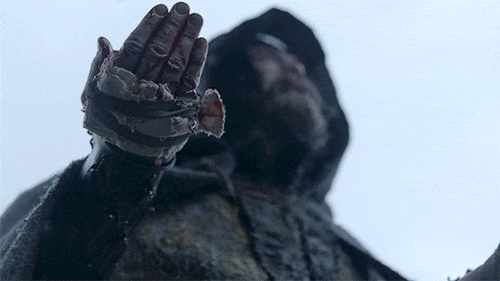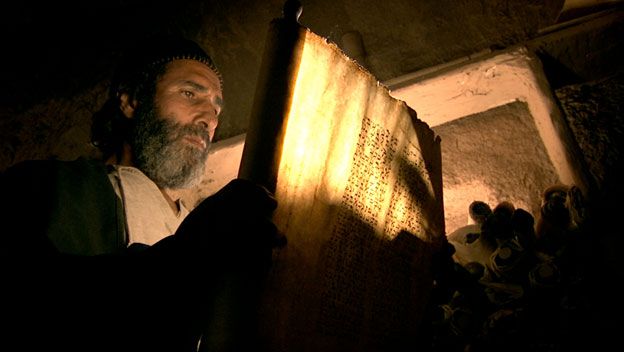In context, Jesus said: “Father, forgive them, for they do not know what they are doing.”Father, forgive them.—Luke 23:34.
Jesus was likely referring to the Roman soldiers who drove the nails through his hands and feet. Jesus refused to allow the injustices he had suffered to make him bitter and resentful. (1 Pet. 2:23) Like Jesus, we need to be willing to forgive others. (Col. 3:13) Some, including relatives, may oppose us because they do not understand our beliefs and our way of life. They may lie about us, humiliate us in front of others, destroy our literature, or even threaten to cause us physical harm. Rather than harboring resentment, we can ask Jehovah to open the eyes of those who oppose us so that they may one day see the truth. (Matt. 5:44, 45) At times, we may find it hard to forgive, especially if we have experienced gross injustices. But if we allow bitterness and resentment to take root in our heart, we hurt ourselves. (Ps. 37:8) When we decide to forgive, we are choosing not to let negative experiences make us bitter.—Eph. 4:31, 32. w21.04 8-9 ¶3-4
Ignorance was/is the basis for God's forgiveness. The Roman soldiers certainly had no understanding of the Scriptures, and hence no basis to accept Jesus as the Messiah, although after seeing the earth-shaking phenomena when Jesus died one Roman officer was moved to proclaim: 'Surely, this was God's son' The Jews, on the other hand, were not as ignorant. Multitudes saw firsthand the healings and miracles Jesus performed and heard him speak. But, because they were under the influence of the Pharisees and others of the Jewish religious establishment, they were misled into calling for Jesus to be put to death. Although a few of the ruling class recognized Jesus as the Messiah, Jesus indicated that the Pharisees as a group were far more guilty than those they ruled over. That is why Jesus posed the somewhat unsettling question: "How will you flee from the judgment of Gehenna?"
Jesus is the same yesterday, today, and forever. The divine judgments of the past are a legal precedent for the future. The letter of James states an important principle: Teachers will receive a heavier judgment. That is especially true of the teachers of the teachers, those who refer to themselves as the faithful and discreet slave class. Jesus indicated that not all are faithful and discreet, at least that is the judgment that will be issued when the Master arrives for a surprise inspection. Although all the slaves will be found to be in error the basis for judgment is whether they are simply ignorant or have willfully disregarded divine authority. Jesus explained: "But if ever that slave should say in his heart, ‘My master delays coming,’ and starts to beat the male and female servants and to eat and drink and get drunk, the master of that slave will come on a day that he is not expecting him and at an hour that he does not know, and he will punish him with the greatest severity and assign him a part with the unfaithful ones. Then that slave who understood the will of his master but did not get ready or do what he asked will be beaten with many strokes. But the one who did not understand and yet did things deserving of strokes will be beaten with few. Indeed, everyone to whom much was given, much will be demanded of him, and the one who was put in charge of much will have more than usual demanded of him." - Luke 12:45-48
Being beaten with many strokes does not result in the erring slave mending his ways and humbling himself. In the condensed version of the illustration of the faithful and evil slaves in the 24th chapter of Matthew, Jesus indicated "he will punish him with the greatest severity and will assign him his place with the hypocrites. There is where his weeping and the gnashing of his teeth will be."
Jesus condemned the Pharisees as hypocrites and offspring of vipers. So, the slave who had been appointed to feed his fellow slaves their food at the proper time, but who willingly consorts with the drunkards of the world will receive the same judgment as the hypocritical offspring of vipers. Weeping and gnashing of their teeth means that they will know beyond any doubt that they have come under divine condemnation and will know the dark fate that awaits them.
As for the ignorant slave who only receives a few corrective lashes, the prophecy of Zechariah speaks to him. It is no secret that the Governing Body claims to be Jehovah's mouthpiece. The Watchtower defines itself as the sole channel through which the truth flows. They consider themselves to be prophets in the sense that only they can decipher biblical prophecy and only they can issue Jehovah's judgments.
As all of Jehovah's Witnesses know, and millions of others besides, the Watchtower has staked its reputation on 1914 as the indisputable year when Christ began ruling as King and when his parousia began. Virtually every prophecy has been attached to 1914 in one way or another. As for the future, we are only waiting for the tribulation to begin and false religion to be destroyed, then it is on to paradise. But Christ did not return in 1914. There is no such thing as an invisible appearance. The horsemen of the Apocalypse have not begun their deathly gallop, and on and on and on the error goes. Here is what is stated concerning the "prophets" at Zechariah 13:4-6: “In that day each of the prophets will be ashamed of his vision when he prophesies; and they will not wear an official garment of hair in order to deceive. And he will say, ‘I am no prophet. I am a man cultivating the soil, because a man bought me when I was young.’ And if someone asks him, ‘What are these wounds between your shoulders?’ he will answer, ‘Wounds I received in the house of my friends.’”
"In that day" is the day of Jehovah, also known as the Lord's day and "the day of Jesus Christ." The sudden thief-like arrival of Jesus will blow everything up. The Watchtower's 1914 whitewashed wall will collapse. The wounds between his shoulders is evidently referring to the figurative lash marks on his back meted out by the Master, Christ. It will be obvious that divine punishment has been administered. "The house of my friends" is the house over which the slave was appointed to feed the domestics therein, also known as Bethel, the house of God. Do not Jehovah's Witnesses refer to the brotherhood as "the friends"? Having unwisely exalted himself as a god the evil slave will pay the ultimate price for his blasphemy. The ignorant and erring slave who went along with the charade will humble himself and claim to be a lowly servant, a man working the soil, a lowly publisher, not a prophet.
On the other hand, according to Jehovah's judgment against ancient Jerusalem, which is a pattern for what is to come, they will have to know that a prophet was among them.

In that day the prophets will be ashamed
Tuesday, September 6 You must be holy.—Lev. 11:45. In the book of Leviticus, holiness is referred to more often than in any other book of the Bible. Since this quality is a requirement for all genuine worshippers of Jehovah, understanding and appreciating Leviticus will help

If the evil slave starts to beat his fellow slaves
“Who really is the faithful and discreet slave whom his master appointed over his domestics, to give them their food at the proper time? Happy is that slave if his master on coming finds him doing so!” — Matthew 24:45-46

I will demand an accounting from them
"This is what the Sovereign Lord Jehovah says: ‘I am against the shepherds, and I will demand an accounting of them for my sheep, and I will dismiss them from feeding my sheep, and the shepherds will no longer feed themselves. I will rescue my sheep from their mouth, and

They will certainly know that a prophet was among them
A November 2022 Watchtower study article is entitled: How Jehovah Helps Us to Carry Out Our Ministry. The scriptural theme is “They will certainly know that a prophet was among them.” — Ezek 2.5 There is no doubt that Jehovah—or
Last edited:
